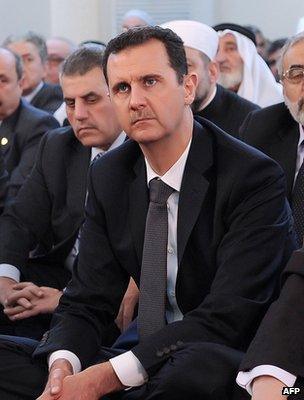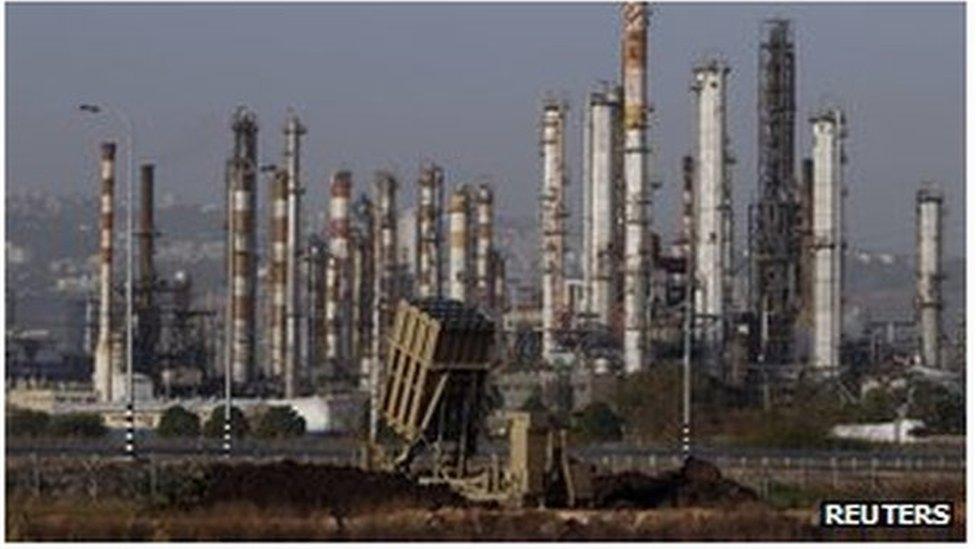The dangerous trends unfolding across the Middle East
- Published

The situation becomes ever more dangerous as the Assad regime loses more and more control
Israel's unacknowledged air strike against Syria was most likely intended as a warning against the Assad regime lest it be tempted to transfer advanced weapons to its allies in the Lebanese militant group Hezbollah.
It is one more sign of an alarming deterioration of the security situation across the Middle East.
US officials have suggested that the Israelis might have struck a convoy carrying sophisticated anti-aircraft weapons to Hezbollah. Concerns have focussed for months on the security of Syria's chemical and missile arsenal and the possibility that a doomed Damascus government might send such weapons to the Lebanese group.
Whether or not there is retaliation for this specific Israeli strike, it is clear that the potential for an engagement between Israel and Hezbollah is now high.
The Israelis have moved Iron Dome missile defence batteries to the north of their country in preparation for a possible repeat of the brief 2006 conflict in which the two belligerents traded thousands of bombs and rockets across the border.
Dangerous trends
This tense situation continues to become more dangerous as the Assad regime loses control of more and more of Syria. It is however just one of several dangerous trends emerging across the region.
Moving from west to east:
In Algeria as well as Libya there is the danger of further al-Qaeda hostage taking as well as attacks on oil facilities
In Egypt violent opposition to the government of President Mohammed Morsi has triggered warnings from the army about the stability of the nation being endangered; Jordan, long a bastion of stability is seeing increasingly strident demonstrations against its monarch King Abdullah
The war in Syria has exacerbated Shia/Sunni tensions across the region
There are calls for a new Sunni insurgency in Iraq
Unresolved issues between monarchy and the Shia majority continue to produce tension in Bahrain and on top of all of this, tensions over Iran's nuclear programme, although lessened by the prospect of imminent diplomatic negotiations, continue to simmer.
In the midst of all of this there are signals, for example in his inaugural speech, that President Barack Obama intends to continue with a policy of non-intervention.
This has confounded the hopes expressed in some European capitals that Washington might provide more of a lead, if only diplomatically, on the Syrian or Iranian issues once he was re-elected.
Western impotence
Some reports circulating in the region suggest that even if Syria used chemical weapons against its own people, the US warnings of a dire response might not actually produce any intervention on the ground to secure these stockpiles.
Instead, it is suggested by some credible sources, that the US might provide support to Turkish and Jordanian forces as they attempted to carry out this mission.
Whatever the degree to which Mr Obama might sanction intervention - and dreadful events on the ground might force his hand - it is clear that the diminished US appetite for warfare, combined with the breadth of the crises enfolding the region, would most likely mean that any direct Western military role would be short lived and of limited significance.
Western countries seem set to observe these unfolding dramas largely in the role of concerned but powerless spectators. There could be all kinds of ramifications - from galloping petrol prices to refugee flows into the countries of southern Europe.
It might be overly melodramatic to paraphrase Britain's foreign secretary, Sir Edward Grey, who said at the outbreak of World War I that the lamps were going out all over Europe, but it seems unlikely that the Middle East can avoid a period of prolonged instability and crisis in the coming years.
Of course the region has long been the leading source of headaches to global policy makers, but the possibility of leakage of weapons of mass destruction and the sharp exacerbation of religious tensions in the region seem set to make things even worse.
- Published5 May 2013

- Published31 January 2013

- Published29 November 2011
